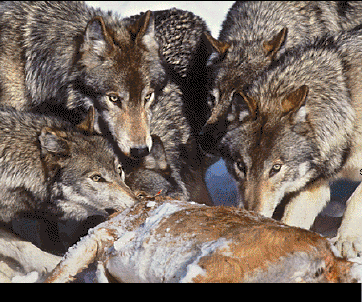
What's for dinner?

![]()
|
When food is plentiful, the average wolf will eat anywhere from five to
twelve pounds of food a day. A full grown wolf, however, can eat
as much as twenty pounds of meat at one time. Wolves tend to eat
whatever their environment offers. In addition to active hunting,
wolves also scavenge for food.
In the tundra, wolves prefer caribou, but they have been known to eat mice, ground squirrels, and various birds. Red wolves tend to eat these smaller animals more often than the larger gray wolves. Raccoon and white-tailed deer are also a main staple in the red wolf's diet. Wolf food selection changes with the seasons. In Canada, for example, gray wolves hunting alone in the summer months turn to beaver. When hunting in pack formation in the winter, they hunt game animals such as bison, caribou, deer, elk, moose, and musk oxen. While it is easier for wolves to hunt these larger animals as a pack, they are capable of killing them individually. Wolves also rely on fish as a year-round source of nourishment where fish are plentiful. Not all wolves, however, have the luxury of a varied food supply. In Ethiopia, for example, where there is much competition for food among packs, wolves live entirely off rodents. |